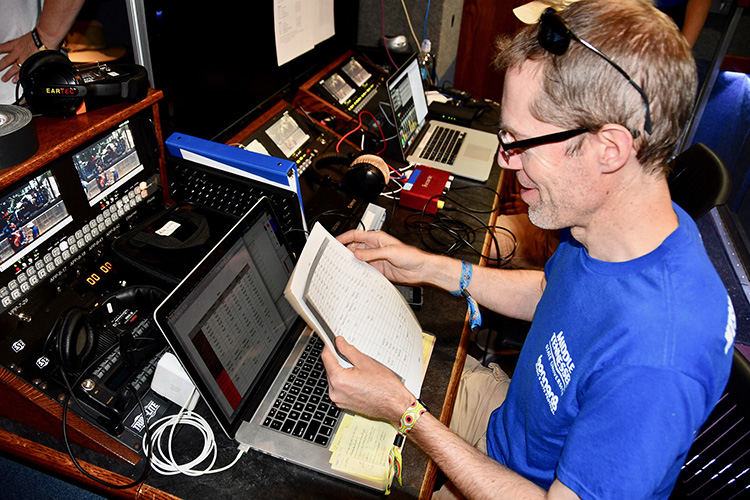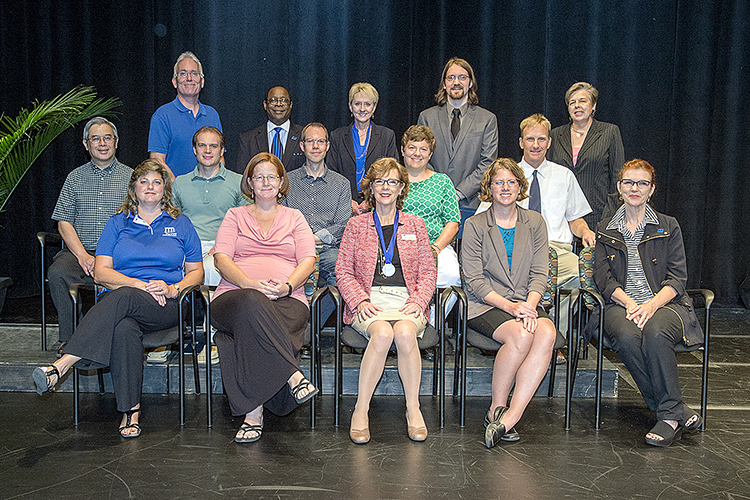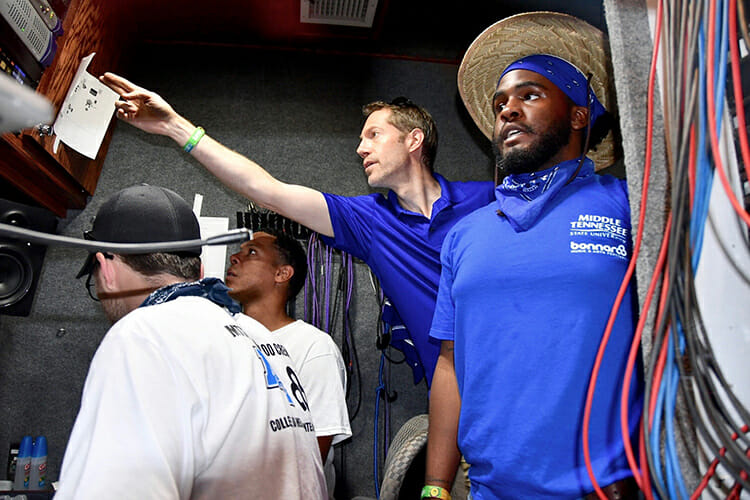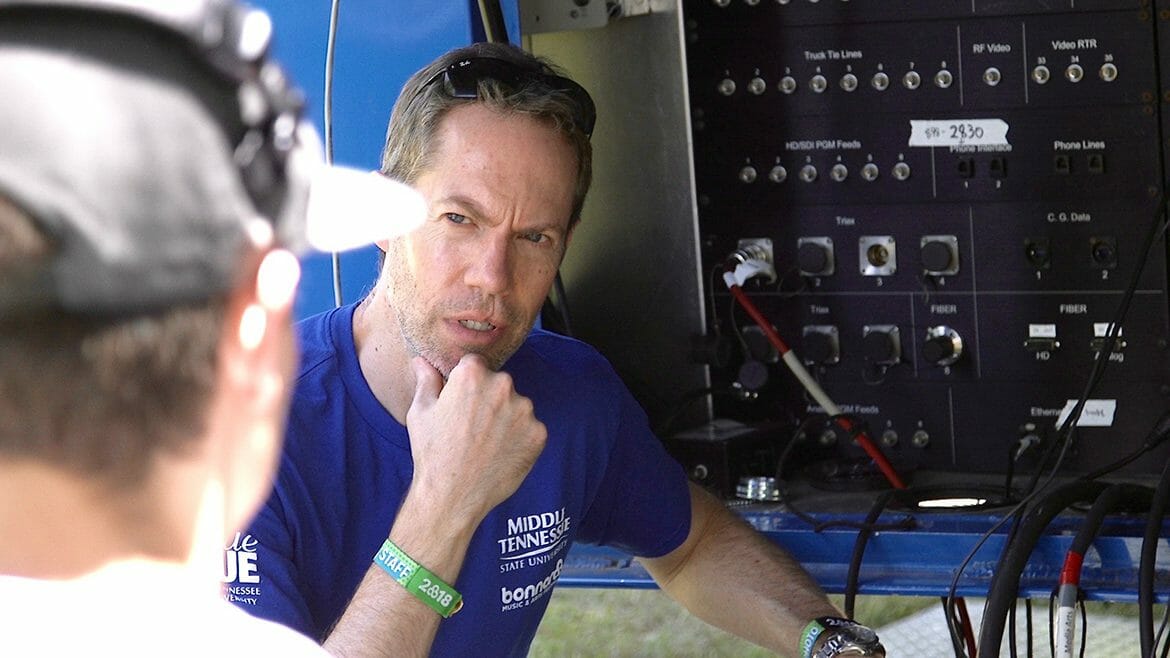A degree in physics, a degree in sound recording, and a little bit of Celtic band fiddle-playing? The Student Voice had the opportunity to sit down and chat with Michael Fleming, a professor in our Department of Recording Industry, who teaches practically the entire process of audio production. And yes, while he’s a classically trained violinist, his repertoire has some broad horizons.
Thanks for agreeing to talk to us! Start by giving us a little bit about your academic and professional background.
Well, I wasn’t sure what I wanted to study as an undergraduate. I thought I might pursue a natural science or history degree, but I ended up pursuing and completing an undergraduate degree in physics. That may seem like an odd turn, but I was very interested and had the ability to do experimental and theoretical work in physics.
It turns out that it was a wonderful convergence of types of technologies and scientific principles that were relevant to me. In particular, I enjoyed learning about electronics, electromagnetism, and acoustics – all of which are extremely relevant to the world of audio, which I eventually ended up in. I feel lucky that I was able to approach audio from a scientific and technical point of view, as far as formal education goes at that level.
But at the same time, I was studying physics in undergrad, I was also heavily involved in music and theatre, both as a performer and as a technician. I am a classically trained violinist, taking private lessons and playing in orchestra and chamber groups throughout most of my formal education. I was also involved in technical theatre, working in lighting, sound design (and) set construction in addition to performing.
I didn’t go straight to grad school; I had some unique training and apprenticeship opportunities after I got my first degree. I ended up working in public radio production for a handful of years in Boston at WGBH radio, which is a major NPR and PBS affiliate. After that, I attended McGill University in Montreal for a master’s degree in music.
Their graduate degree in sound recording has a sort of European origin based on the Tonmeister programs of Germany and Poland. What that means is that the candidates for master’s at McGill have a strong musical background, and we’re trained further in audio technology and music production. I already had professional experience in those areas, but McGill offered a chance for more experience with pop genres, multitrack productions, sound for picture and some other advanced applications.
Physics and music … interesting! Does this give you an advantage, knowing the details of each side of audio?
I suppose it does! I think they both shed light on each other and let you appreciate things from those two perspectives. When I’m in the midst of making music or appreciating good music, I certainly try to avoid using the engineering side of the brain all of the time, even though it can be hard to turn off.
When it comes to doing creative production or being involved in performance in a physical venue, the knowledge of physics and acoustics can help solve problems and understand what’s perceivable and what can be done in a technical way.

Michael Fleming, a professor in MTSU’s Department of Recording Industry, double-checks details June 16 while mentoring students working on the Who Stage at Bonnaroo 2019 in Manchester, Tenn. (MTSU photo by Andrew Oppmann)
So you work closely with what we call the “MTSU Bonnaroo Campus.” Tell us about how that sort of project is beneficial for students.
From the student perspective, I think it’s so important! It forces you to use knowledge, theory, and instinct in a practical way under unique circumstances. It’s modeling a professional practice as closely as possible. For students who have only used university labs or studios to do coursework or modest projects of their own, it really is eye-opening to be thrust into this noisy, busy, pressure-filled, real-world environment where they have to filter their knowledge and try to apply it the best they can.
I think that one of the things that’s unique about the “Bonnaroo campus” is that most activities we do there are team-based. Everyone has an individual responsibility, but we have to work together, which requires defining the problems we want to solve or fully understanding the goals or mission for a particular activity. I think students grow when they have the opportunity to define those tasks for themselves or with the help of a faculty member. They figure out how to execute the task and to face obstacles and learn from their mistakes to discover that they can accomplish remarkable things.
Thinking about Bonnaroo and all of the success some of our students and alumni have found in the Recording Industry… what is it like to be a part of such a renowned program?
I think we all celebrate the success of alumni and people affiliated with MTSU because it’s nice to see and share our former students’ successes. We can’t always take full credit for that, of course, but the program has been around long enough that it isn’t surprising that we have so many successful alumni and people who help reflect credit or attention back on the College of Media and Entertainment.
You never know where great students with amazing potential will come from, but we hope the attention leads to prospective students considering MTSU as an option.
The positive publicity can bring awareness to the unique things we do, and I think it’s important for prospective students to discover that there are a lot of things they can learn and a lot of paths they can try out at MTSU. When we share the success of some of our alumni, we hope that it is appealing and inspiring for current and prospective students.
I’m really grateful that MTSU offers the chance for faculty to continue to practice the skills that we are exposing our students to. I consider myself versatile because a couple of recent records I’ve worked on have been song cycles of contemporary classical music, but another one for which I was a co-producer and co-engineer was a “rockin’ roots” record with a former Nashville singer-songwriter. I think that kind of professional development practice is important to us and reflects the kind of background that students benefit from.
If we’re learning ourselves as faculty and professionals, gaining new skills and exercising those capabilities on an ongoing basis, that means that we have more relevant experience that we can feed back into the classroom. I try to practice what I preach!

MTSU faculty members gather for a group photo after they were recognized by the MTSU Foundation for their service Friday, Aug. 22, at the 2014 Fall Faculty Meeting inside Tucker Theatre. Thirteen of the 18 recipients and their honors include, front row from left, Nancy E. Stubblefield, Outstanding Public Service Award; Dr. Ashley Morris, Special Projects Award; Dr. Paula Thomas, Career Achievement Award; Dr. M. Dawn McCormack, Outstanding Teaching in General Education Award; and Dr. Janis Brickey, Creative Activity Award. Second row from left are Dr. Ngee Sing Chong, Distinguished Research Award; Dr. Cyrille L. Magne, Distinguished Research Award; Michael S. Fleming, Outstanding Achievement in Instructional Technology Award; Dr. Wendy S. Beckman, Outstanding Public Service Award; and Dr. Jeremy Winters, Outstanding Public Service Award. Standing from left are Dr. Thomas M. Brinthaupt, Outstanding Achievement in Instructional Technology Award; MTSU President Sidney A. McPhee; MTSU Foundation President Kathy Jones; Dr. Jonathan M. Bradley, Outstanding Achievement in Instructional Technology Award; and Dr. Rebecca M. Fischer, Outstanding Teacher Award.
What classes have you taught that students may be interested in?
I’ve taught a lot of classes in both the undergrad and graduate programs in Audio Production. I’ve basically taught most of the signal chain from Audio Signals and Systems (RIM 4100), Critical Listening (RIM 4440), all the way through Recording Studio Techniques (RIM 4400), Multitrack Studio Recording (4650), and Audio Mastering (RIM 4580).
I’ve also taught special topics courses, including Classical Remote Location Recording and the Bonnaroo production. At the graduate level, I’ve taught courses in digital audio, the Recording Studio Seminar, and Location and Remote Production.
I’m teaching a new topics course in fall 2019 on Broadcast Audio Production, which reflects an area of growing sophistication for our department, and it takes me back to some of my early professional roots as a radio broadcast engineer and producer. We’ve received some technology access funding to upgrade some of the technical infrastructure and audio consoles for the college’s remote truck and also for a couple of the studios in the Media and Entertainment Building.
My broadcast audio course will introduce students to the new infrastructure and technology we’ll be using and also create a training pathway for audio students to support real-time broadcast production, whether it’s in conjunction with the video and film program, multicamera production, like we do at Bonnaroo, or radio and news production. This is going to be a completely new course and collection of content I’m exploring for the fall.
Nice! I have to ask … I read that you played fiddle for a Celtic band for a little bit. How was that?
Yeah, that was a lot of fun, no doubt about it! I was lucky to spend a couple of years as the chief engineer at Appalachian State University before I came to MTSU. Some of my colleagues in the School of Music there included a harpist, a flute player, a guitar player and a percussionist. As a classical violinist, I had a little bit of exposure to fiddle music, but Celtic music was something I hadn’t done a lot of and I really enjoyed learning a whole new repertoire.
We did a number of live performances at Appalachian State University, and we would, on occasion, rehearse in the back room of a small pub and restaurant near campus. Several of my colleagues taught on the study-abroad class to Ireland, and they talked about how they brought their instruments and joined sessions in pubs. We wanted to emulate that the best we could, and to me, that level of spontaneity and improvisation is what makes Celtic music so fun.

Michael Fleming, center, a professor in MTSU’s Department of Recording Industry who teaches audio engineering, helps Tevin RaShad Turner, right, a graduate student in recording arts and technologies, troubleshoot audio feeds before the first concert on the Who StageJune 9 at the 2018 Bonnaroo Music and Arts Festival in Manchester, Tenn. Turner was the audio team leader for MTSU’s work at Bonnaroo 2019. (MTSU file photo by Andrew Oppmann)
Last question: What is your biggest piece of advice for college students?
I’ll give you a few. I think that one of the most important things to do is to try and honor your priorities. Getting the most out of school requires time and attention, so prioritize the time you spend studying, doing work, and engaging in extracurricular activities. I see a lot of students with great potential get stretched too thin or face very difficult choices regarding their priorities, so my advice flows from that. To the best that you can, try to make choices that reflect your goals and recognize that it takes time outside of class to really get the most out of what a particular course has to offer.
Another piece of advice would be to not be afraid to ask for help. In my experience, all faculty members are there and want to spend time with students who come to us, not just asking for help as a remedial request, but also who demonstrate curiosity and interest in the subject and can benefit from conversation and storytelling assistance in understanding a concept or encouragement when it comes to completing an assignment or working on a project. Students are missing out on a great deal of available help, support, and encouragement if they don’t meet their faculty and take advantage of the time and attention that is available to them.
My last piece of advice is to seek out opportunities to test yourself and practice the skills you are learning, particularly in the College of Media and Entertainment. I mentioned before that many of the activities we do are team-based, so you need to work with your peers and participate in group projects, get involved in student media production, attend events that bring in guest speakers and professionals who can share their advice and start practicing the skills of collaboration and continuous learning, because you’ll need those skills in the professional environment.
Author Kobe Hermann is a senior at MTSU, majoring in management in the Jones College of Business and minoring in business administration.


COMMENTS ARE OFF THIS POST